
To be listed on the CAMPOSOL TODAY MAP please call +34 968 018 268.
article_detail
Spanish News Today Editors Roundup Weekly Bulletin Oct 27

FEATURED ARTICLES: "Clocks go back an hour this weekend" and "Police confiscate 100,000 products because their labels are not in Spanish"
They say you can’t turn back the clock, but that’s exactly what millions of people are going to be doing this weekend as Daylight Savings Time ends in Spain and the rest of Europe. It’s not every day that you get back an hour of your life… in fact, it only happens once a year, so enjoy it!
In the news this week, there have been loud announcements from the government about reduced working hours and the scrapping of short-haul flights, which we’ll dig into in detail, and the story that more than 100,000 food and cosmetic items have been seized from a well-known supermarket chain by police because they weren’t labelled in Spanish.
Let’s begin!
Promises, promises…

Much has been made this week of an announcement by Spain’s President and Vice President that they will reduce the workweek from 40 hours down to 37.5, as well as raise the minimum wage, increase maternity/paternity leave from its current 4 months and ban short-haul domestic flights where an alternative exists to make the same journey by train in under two and a half hours.
Other incredible parts of their announcement included such policy ideas as making 20% of all available housing in Spain council houses, guaranteeing access to public education for children as young as two years old, placing even more taxes on banks and large energy firms and repealing the so-called ‘gag law’ that provides near indiscriminate powers to police during mass public demonstrations.
But will all of this really happen? Dig into the truth of the facts a little bit and it starts to sound more spurious…
You may remember that back in July Spain had a general election in which no single party emerged with a sufficient majority to form a government. First, then, it was the turn of the conservative PP party, who received the most votes, to try and forge a coalition, but that failed when it turned out no one wanted to work with far-right VOX.
Now, it’s the turn of incumbent Pedro Sánchez and his Socialist PSOE party. Right now, then, he’s Acting President and his Vice President and leader of the leftwing alliance Sumar, Yolanda Díaz, is only in office as a Caretaker. So any promises this pair makes of what they are going to achieve for the country – such as reducing the workweek – are conditional on them being able to work together to form a government.
However, the fact that these two leftwing partners have agreed to work together is no guarantee that they will be able to form a coalition government either because they need the support of several small, independent parties in Catalonia, who, before they will sign on the dotted line, are negotiating for an extremely controversial amnesty deal for around 1,500 people charged with sedition for unilaterally trying to secede from Spain in an illegal referendum in 2016.
All of which is to say, that if the PSOE and Sumar haven’t managed to form a government by the end of November (a prospect which seems increasingly likely) then there will be fresh elections in Spain in January.
In the light of this, then, the announcement that they want to cut the workweek back by 2.5 hours over the next two years, getting closer to France’s 35-hour workweek, or that they will outlaw short-haul domestic flights all begin to look less like set-in-stone policies and more like election promises.
Not only that, but such policies hide flaws that aren’t obvious at first.
For instance, while a decrease in the workweek would be welcomed by many employees and could even improve productivity in office jobs, it would limit progress in certain sectors, such as construction, and make each working hour more expensive, leading employers to be less likely to hire new staff. This flies in the face of the politicians’ other stated aim, to improve youth employment statistics and reach 100% employment in the country.
 Meanwhile, the ban on short-haul domestic flights would really only affect a handful of journeys, all of which go through Madrid airport. The aim of the measure is to reduce carbon emissions by relying on Spain’s admittedly quite good and ever-improving railway system. But at the moment there are no high-speed AVE rail trains that stop at any Spanish airports, with the first one planned being Madrid’s Barajas Airport in 2026. This somewhat scuppers the purpose of many of these internal flights within Spain, which is to act as a connecting flight to other, international destinations such as Latin America and the United States, and so it could end up damaging the Spanish tourism industry.
Meanwhile, the ban on short-haul domestic flights would really only affect a handful of journeys, all of which go through Madrid airport. The aim of the measure is to reduce carbon emissions by relying on Spain’s admittedly quite good and ever-improving railway system. But at the moment there are no high-speed AVE rail trains that stop at any Spanish airports, with the first one planned being Madrid’s Barajas Airport in 2026. This somewhat scuppers the purpose of many of these internal flights within Spain, which is to act as a connecting flight to other, international destinations such as Latin America and the United States, and so it could end up damaging the Spanish tourism industry.The world of politics is a mucky one that we try not to sully you with too much in this bulletin, but sometimes a bit of background to such stories as the ones that have emerged this week is useful for understanding the context and the truth behind the headlines.
Now, I promise to try not to mention politics again either until there is a new government in power or there is another election to contend with.
Police confiscate 100,000 products because their labels are not in Spanish
This is the news that a police operation spanning the Spanish provinces of Albacete, Alicante, Almería and Murcia, all in the southeast of the country, has resulted in the seizure of 118,000 food and cosmetic products on the grounds that the labels were not written in Spanish.
According to Spanish law, all such products sold in the national territory must have Spanish labelling so that consumers are “aware at all times, in a clear and understandable manner, of the content of the products they purchase, in order to avoid, among other things, possible health problems such as poisoning and allergic reactions derived from its use or consumption.”

Of course, such a law assumes that everyone in Spain can read and understand Spanish, which is clearly not the case. According to a police press release, all the products they confiscated were in “a well-known supermarket chain,” although they didn’t say which one.
There were loads of brands of chocolate biscuits, crisps and more that were seized during the course of separate inspections of 16 different shops, leading police to issue no fewer than 32 fines for failing to comply with the law.
Fall back and lie in
As we approach the end of October, it’s time for your yearly reminder that the clocks go back an hour this Saturday night/Sunday morning. At 3 o’clock in the morning on Sunday, it will suddenly become 2 o’clock and we will all get to lie in bed for an extra hour on Sunday morning… if the dogs will let us, that is!
Despite repeated protestations that this year will be the last time (“No, but really, we’re honestly never doing this again for real this time…”), Spain continues to observe Daylight Savings Time, which comes to an end in Europe on the last Sunday in October. They’ve talked about scrapping it for ages, but for the time being we’re lumped with it.
Curiously, owing to a historical quirk, Spain’s time zone is actually out of kilter with the rest of Europe, and they are an hour ahead of where they should be anyway. You see, Portugal and Spain’s Canary Islands are at around the same longitude as the UK and Ireland, and so they have the same time zone. Mainland Spain should also fall into this category, but because Spain’s dictator Franco was such a huge admirer of Hitler back in the day, he decided he wanted mainland Spain to follow Central European Time instead of Greenwich Mean Time. There has also been mention in the past of correcting this historical wrong, but of course nothing has come of it yet.
As the evenings get darker earlier, Spain celebrates another holiday in the middle of next week. No, it’s not Halloween, although naturally there’s plenty going on to keep the kids (and some of the adults) entertained this Tuesday October 31, ‘the spookiest night of the year’.
No, I’m referring, of course, to All Saints’ Day, Spain’s ‘Día de Todos los Santos’, when every single saint in the Catholic pantheon is given their due. This is actually All Hallow’s Day on November 1 – the day after Halloween – which actually gave rise to All Hallow’s Eve in the first place.
According to ancient legend, it is a day when the spirits that have risen to walk the earth the night before return to their graves. In Spain, it was customary for families to visit the resting places of their departed loved ones on this day, but that’s not such a common practice anymore. Instead, November 1 is taken as just one more school/work holiday, when the usual supermarkets and shops are closed. A chance for an extra lie in!
Murcia
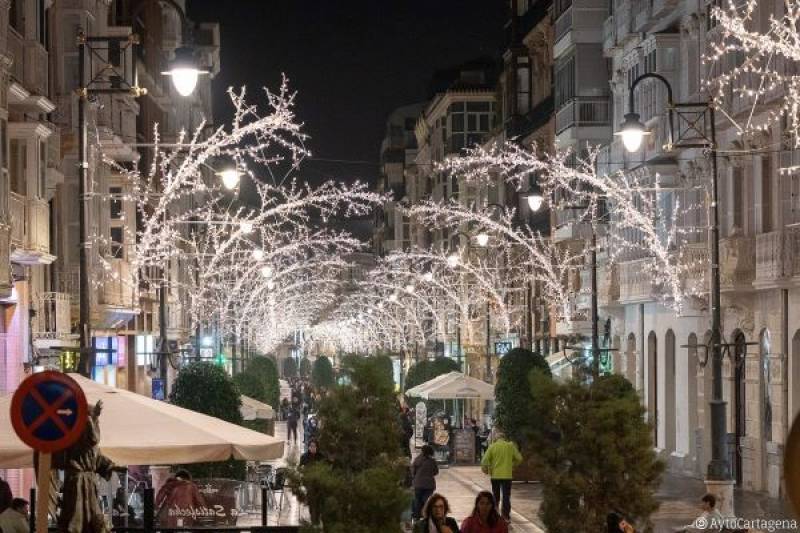 While Halloween may not even have come yet, some minds are already turning towards Christmas, not least of all Cartagena City Council. This year, the Council is investing over half a million euros to bring Christmas lights and decorations to more streets in Cartagena city centre and surrounding towns and villages that fall under the remit of the municipality, such as Cabo de Palos and La Manga del Mar Menor.
While Halloween may not even have come yet, some minds are already turning towards Christmas, not least of all Cartagena City Council. This year, the Council is investing over half a million euros to bring Christmas lights and decorations to more streets in Cartagena city centre and surrounding towns and villages that fall under the remit of the municipality, such as Cabo de Palos and La Manga del Mar Menor.Normally, it is Calle del Carmen that is the focus of Cartagena’s Christmas lights, with its white LED almond branches, but this year they will also be put up in other areas of the city, including Puertas de Murcia, Santa Florentina, Jabonerías and the Plaza San Sebastián. Not only that, but the decorations will have, in the Council’s words, “elements in matt gold and shades of purple and pink” so that they can glitter and sparkle in the daytime as well as at night.
The announced switch-on for the Christmas lights in Cartagena this year is on Friday December 1… which incredibly is little more than a month away already! The lights will stay up until Sunday January 7, 2024, after the Spanish Día de los Reyes Magos celebrations.
 Elsewhere, local residents are thrilled that the lights have been turned back on again, but not the Christmas lights. These are the lighting fixtures of the communal areas of the Al-Kasar shopping centre on the Condado de Alhama urbanisation and golf resort, where there has been no communal power at all this summer, and therefore no external lighting.
Elsewhere, local residents are thrilled that the lights have been turned back on again, but not the Christmas lights. These are the lighting fixtures of the communal areas of the Al-Kasar shopping centre on the Condado de Alhama urbanisation and golf resort, where there has been no communal power at all this summer, and therefore no external lighting.The owners of the mall are none other than Sareb, the state-owned ‘bad bank’ which bought the centro comercial after its previous owners, Polaris World, fell into bankruptcy back in 2016.
While this small issue has been resolved and Condado homeowners and the residents’ association have been able to push Sareb to turn the lights back on, the shopping centre continues to rely on volunteers and local businesses to pull up weeds and keep the place clean. The Condado de Alhama Board of Presidents still stands behind its June decision to take legal action against Sareb Bank to force them to take care of the centre.
One Town Hall that is certainly taking good care of its local area is Mazarrón, where the Ayuntamiento has recently begun integral road improvement works on two different avenues in the coastal area of Puerto de Mazarrón.
On the seafront Avenida del Mediterráneo, the project is to build a cycle lane along with pedestrian areas, parking and traffic areas, with the objective of improving mobility in the area. There will also be renovation of sanitation, stormwater, telecommunications, lighting, road surface and pavement facilities, and work is expected to last for a full 6 months.
Meanwhile, on the Paseo del Alamillo just down the coast, a section of road will be closed to traffic for the next month (although access will still be available for residents of the southern area of the El Alamillo Urbanisation) for more important roadworks.
The Town Hall has also shown its respect for one of its own and for the international community by declaring two days of official mourning in memory of Silvana Buxton, the Councillor for Camposol and International Relations who died last Friday, October 20.
Silvana, a much-loved and hardworking local character whose passing we were saddened to have to report last week, was laid to rest this Tuesday with a moving funeral service performed in both Spanish and English. As a mark of respect, the Mazarrón municipal flag on municipal public buildings flew at half-mast on October 24 and 25 as a symbol of mourning and solidarity.
To see events coming up soon in the Region of Murcia, check out our EVENTS DIARY:
Spain
Tragedy struck the Canary Island of Lanzarote earlier this week when a British teenager, on holiday in Spain with his parents for half term, died after falling from a second-floor balcony.
The family had been staying at the three-star Galeon Playa Apart-Hotel and the accident occurred shortly after 7.30am. The 18-year-old was rushed to Doctor José Molina Orosa Hospital in Arrecife with “very serious” injuries and sadly died a short time later.
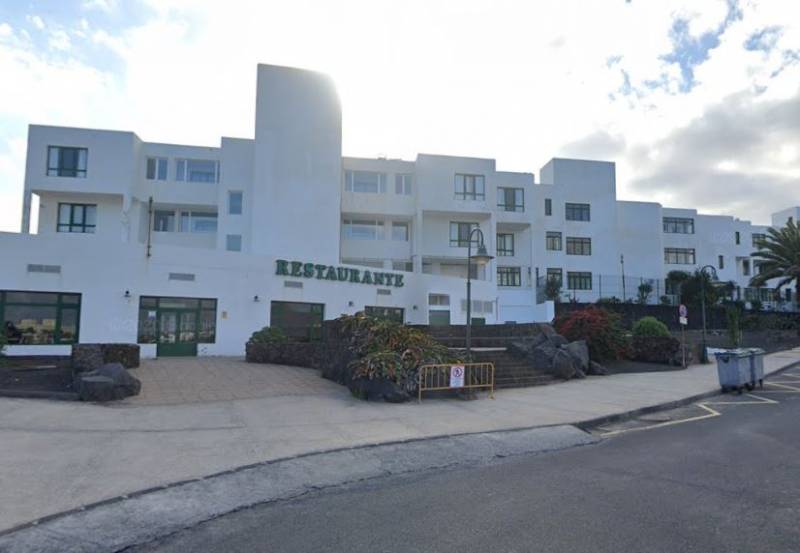
A source close to the investigation said: “This was an accident that wasn’t alcohol-related or linked to any improper behaviour on the part of the teenager who died like climbing between balconies.”
There’s some bad news for English-speaking tourists and expats who have the misfortune of being the victims of crime, as it’s no longer possible to report minor incidents like break-ins or thefts over the phone in English.
Instead, anyone targeted by criminals who doesn’t have a very good command of the Spanish language will need to report the incident via the National Police’s Virtual Complaints Office.
The form is very straight-forward and the website has plenty of helpful tips for completing it, but here’s the rub: the complainant will still need to go to their local police station within 72 hours of completing the online form to sign it in person, or the report will be null and void.
Officials are at pains to highlight that the system is only suitable for non-serious incidents, so the Virtual Complaints Office shouldn’t be used if the crime involved physical violence or intimidation.
Likewise, if the victim recognises the perpetrator or believes there could be witnesses, they should report the matter directly to the police.
After months of delays and speculation, Europe has at last put an end to the misinformation surrounding the roll-out date of the European Travel Information and Authorisation System (ETIAS).

The ETIAS is a visa waiver for travel within the Schengen zone, similar to the ESTA scheme required for entry into the United States. Once it’s in force, Brits and other third-country nationals aged between 18 and 70 will have to apply and pay for the permit before visiting any of the 27 member states. Over-70s will also need to apply for the ETIAS, but it will be free.
The trouble is that the ETIAS goes hand in hand with the Entry/Exit System (EES), IT architecture that has to be up and running at least a few months before the visa waiver scheme can be brought in.
All being well, this EES should be in place by the autumn of 2024, meaning that ETIAS will be rolled out in airports across Spain from spring the following year.
Once travellers are required to apply for an ETIAS permit, the documentation will replace the manual stamping of passports. It’s hoped this will speed up security checks while keeping tighter control of borders.
Alicante
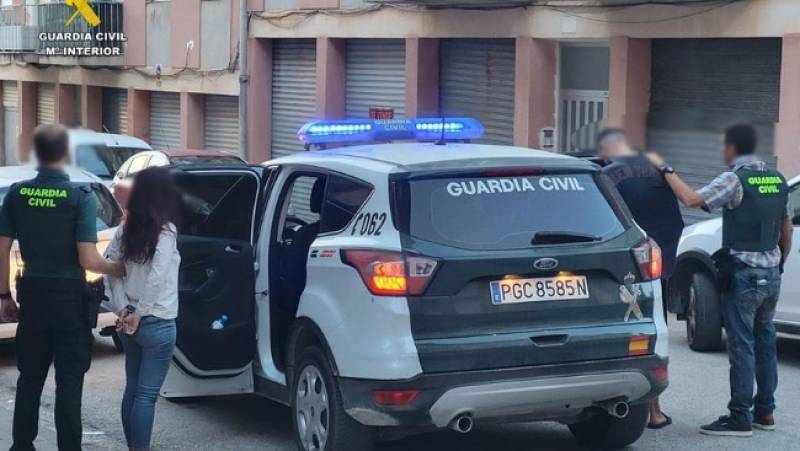 Guardia Civil in the town of Callosa d’en Sarrià, just half an hour from Benidorm, arrested a 25-year-old Frenchman and a 32-year-old Spanish woman this week. The pair is suspected of being responsible for a string of home invasions, thefts and material damage.
Guardia Civil in the town of Callosa d’en Sarrià, just half an hour from Benidorm, arrested a 25-year-old Frenchman and a 32-year-old Spanish woman this week. The pair is suspected of being responsible for a string of home invasions, thefts and material damage.The investigation originally began back in August when a local man reported that his car had been broken into. The thieves swiped his bank details, which they later used to withdraw a large amount of cash, and keys to a storage unit he was renting.
Their mistake came when they decided to search the storage shed, and were caught on CCTV. Police later trailed the pair to the small Alicante town of Callosa d’en Sarrià and discovered they were illegally squatting in a house. A search of the property on September 13 turned up jewellery, personal documentation belonging to their victims, various household appliances and the tools used to break into the houses.
While a large part of the stolen goods has been returned to their rightful owners, several items have still not been claimed, leading the police to believe that there are still more victims out there.
It’s been a summer of delayed and cancelled flights across Spain but a plane-full of passengers from Manchester suffered a frustrating ordeal this week when their aircraft was diverted not once, but twice, before eventually landing 1,500 miles from their original destination.
 The packed plane was headed for Lanzarote when bad weather on approach forced the pilot to first announce a diversion to Tenerife. Sadly, things weren’t much better on the island and the plane was instead pointed in the direction of Alicante, where it landed in the wee hours of the morning.
The packed plane was headed for Lanzarote when bad weather on approach forced the pilot to first announce a diversion to Tenerife. Sadly, things weren’t much better on the island and the plane was instead pointed in the direction of Alicante, where it landed in the wee hours of the morning.A long day of travel wasn’t over yet though and the passengers, many of whom were travelling with small children, were packed onto a coach and transferred to Benidorm, where Jet2 had organised a hotel.
“We waited 40 minutes for our luggage, 30 minutes to get a coach and when we finally arrived in Benidorm at 5.15am we had to queue in the cold to get a room in the hotel,” one passenger said.
“The hotel is right on the Benidorm strip filled with drunken revellers on a Saturday night. This flight is filled with children,” he added.
After a few hours of shut-eye on the Costa Blanca, the disgruntled families were collected again the following day and flown to Lanzarote.
Andalucía
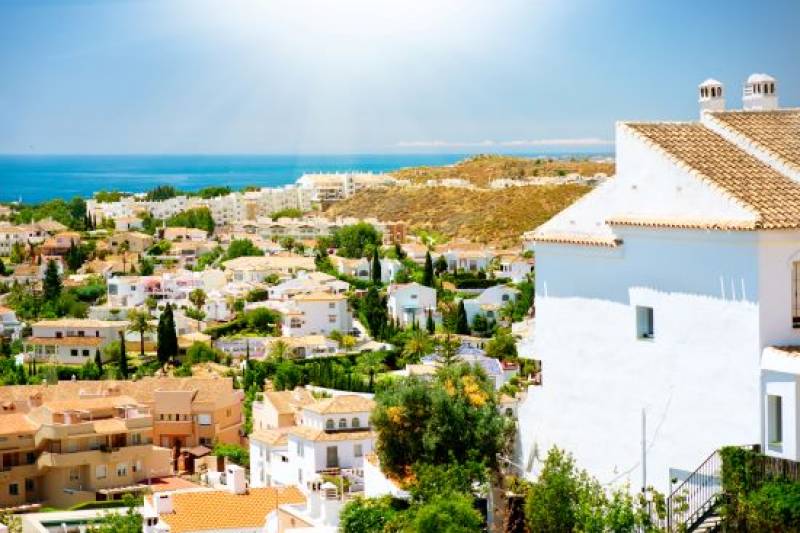 We tend to think that property prices only go one way, and it’s not down, but the province of Málaga seems to be bucking that trend. A new market survey for property stats over the last three months indicates that house prices on the Costa del Sol have fallen for the first time in two years.
We tend to think that property prices only go one way, and it’s not down, but the province of Málaga seems to be bucking that trend. A new market survey for property stats over the last three months indicates that house prices on the Costa del Sol have fallen for the first time in two years.Since the Covid-19 pandemic, Málaga property prices have been steadily increasing, in large part thanks to a surge in demand by foreign buyers looking for a slice of that longed-for paradise in the sun and a better quality of life after the hardships of lockdown made people realise what is really important to them.
Well, maybe the lessons we learned in lockdown have started to fade from memory now or maybe it’s just a blip, but for whatever reason there was a decrease of 3.8% in house sales in the province over the past three months and a fall in the average price per square metre from 2,446 euros down to 2,352 euros.
While this general trend has been detected all along the Costa – in Malaga city, Benalmádena; Estepona, Fuengirola, Mijas and in Torremolinos, among others – the experts do not actually think this is the start of a general slowdown or major drop in house prices.
Sure, house prices can’t really go on getting more expensive indefinitely, but for now the sheer quantity of new builds on the coast point to a level of interest in Costa del Sol properties that is likely to keep house prices rising in the long run.
As a homeowner, you’d much rather the price of your house fell than have the property itself drop down into the void. That was the terrifying prospect faced by residents of the picturesque Cádiz town of Arcos de la Frontera this Thursday when a sudden landslide threatened to send their homes plummeting down a sheer cliff face.
Along with neighbour Vejer de la Frontera, Arcos is one of those towns perched on the top of a hillside in Cádiz and which are incredibly popular towns for people to visit thanks to the beautiful winding cobbled streets and incredible views over the Andalusian countryside.
But having a town with homes built so close to the side of a mountain has its downfalls, not least of which is the fact that inhabitants are constantly living on the edge.
Thankfully, no one was hurt in the landslide on the cliff known as Peña Vieja (Old Cliff) and the houses right next to ridge of the Andalucía town’s cliff did not fall down, but this is not the first such landslide Arcos has had to contend with and several people will be wondering how long it will be before their houses and the town itself suddenly find themselves not at the top of the mountain but at the bottom of a valley!
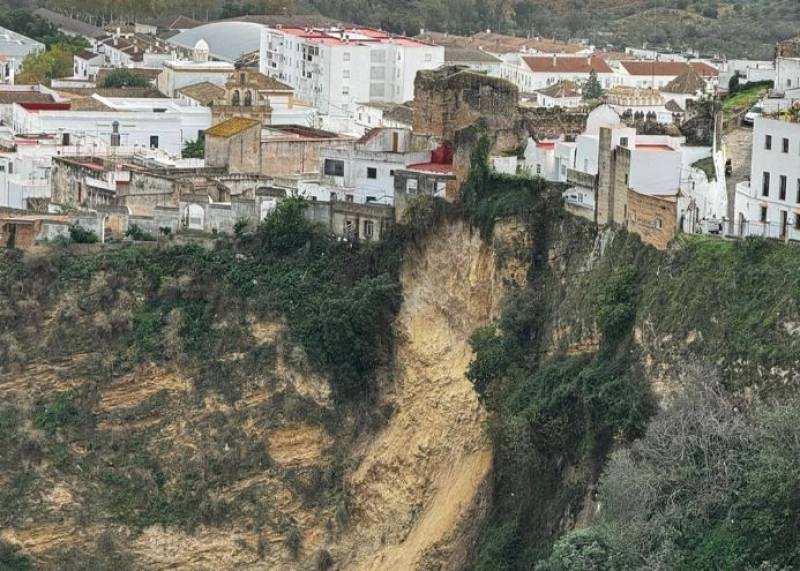
You may have missed…
- Murcia medical cards will be issued at the primary health centres.
Medical cards have not been issued in Murcia for at least a year and a half, but now the system should be easier and faster. - Spain transfers hundreds of African migrants amid wave of small boat arrivals.
In response to the unprecedented numbers of illegal migrants making their way from Africa to the Canary Islands this month, the Spanish government has accelerated the transfer of hundreds of people to the mainland. - Two wins in a row for the British Isles team in La Manga Club Micasamo Nations Cup.
Congratulations to the British Isles tennis team, the title defender of the Micasamo Nations Cup tournament, who won their second consecutive competition on La Manga Club last weekend, this time against the Norwegians! - Spanish kombucha wins award for best in the world.
The kombucha Brava Limón, made in Spain, has received the award for the world’s best kombucha made from a single fruit at the World Kombucha Awards. - 10 unique natural wonders in the Region of Murcia.
From Águilas to Yecla, from Calasparra to Calblanque... these are the 10 natural wonders of the Region of Murcia!
And that’s your bulletin for this week. Don’t forget, turn your clocks back this Saturday night before you go to bed! And we’ll see you next week for more.
¡Adios!
Contact Murcia Today: Editorial 000 000 000 /
Office 000 000 000


























